
March 12

1877 Birth: Wilhelm Frick, Nazi war criminal:
With Hitler firmly in place as Chancellor, the jockeying for position as his number two and therefore his heir took on a new edge, and now there was genuine power at stake. For the moment, there were five possible candidates - Goering, Goebbels, Frick, Roehm, and Hess: but two of these could be discounted at once. Roehm was too much of a maverick, a dangerous, loose cannon who would never be accepted by the army or the 'respectable' middle classes. Hess had considerable authority within the party, and indeed would be named Deputy Fuehrer (for Party Affairs) on 21 April, but he was essentially a functionary with little practical experience as a political operator and was seen strictly as Hitler's deputy, never as his successor. Of the other three, Frick was a skilful politician already holding high office as Reich Interior Minister, nominally ranking higher in the government than Goering, and clearly enjoying Hitler's confidence. But he was lethargic and colorless, at heart a bureaucrat, lacking both the charisma and the ruthless drive of his two colleagues. [For further details, Click here.]
1888 Chinese laborers excluded from U.S.:
Agreeing to cooperate with a policy unilaterally adopted by Congress six years earlier, China approves a treaty forbidding Chinese laborers to enter the United States for 20 years.
In the 1850s, large numbers of Chinese immigrated to the American West. Most came from the Pearl River Delta region of South China, where famine and political instability made it difficult for them to support the large extended families thought to be essential to happiness and success. When exaggerated reports of the California Gold Rush reached China, thousands of Chinese men booked passage for California. In contrast to many of the other immigrants to the American West, few of the Chinese immigrants intended to settle permanently in the U.S. They planned instead to work in the gold fields only until they had saved enough money to return to China and support their families.
Few Chinese, however, found wealth in the U.S. In order to pay for their passage across the Pacific, many Chinese immigrants became indentured servants. Arriving in America with a heavy load of debt, they were forced to work until they had paid back their debt. Chinese and Anglo employers alike took advantage of their plight, paying the immigrants just enough to keep their hopes alive but not enough to free them from debt.
By 1880, just over 100,000 Chinese lived in the United States, the majority of them in California. Most came in hopes of striking it rich in the gold fields, but they quickly learned to make money in whatever way they could. Despite the prevalence of local and state laws prohibiting them from owning certain mining properties or entering into specified businesses, many Chinese succeeded in finding niches. Groups of Chinese immigrants would occasionally band together and transform old mining claims, abandoned by Anglos, into paying operations. Others prospered in businesses like laundries or restaurants, which most Anglo men considered menial "women's work."
Inevitably, the success and distinct culture of the Chinese immigrants made them an easy target for xenophobic Anglos. Wherever they went, however, the Chinese were treated with growing resentment. By the 1880s, many working-class Anglos began to accuse the Chinese of depriving them of jobs and undermining early efforts to unionize the western mining industry. Blatant racism fed Anglo hatred. One San Franciscan argued that God intended the Chinese to remain only in China, for "they are not a favored people, they are not to be permitted to steal from us what we have."
The American government responded to these fears by limiting Chinese immigration with the Chinese Exclusion Act of 1882, the first time that the U.S. excluded immigrants based on race and nationality. Significantly, the Exclusion Act only excluded Chinese laborers. The U.S. continued to welcome merchants, who promised to help Americans maintain lucrative trading ties with the vast Chinese population, and professionals who offered valuable skills. Immigrants from no other nation received such discriminatory treatment.
Six years later, the Chinese government agreed to the fundamental principles of the Exclusion Act. Under pressure from the U.S., the Chinese signed a treaty on this day in 1888 agreeing not to allow any laborers to immigrate to America. Only in 1943, when China became a valuable ally in the war against Japan, did the U.S. finally abandon this blatantly racist policy. (History.com)
1890 Birth: William Dudley Pelley: American Fascist and leader of the Silver Legion:
In 1933, when Adolf Hitler seized control of Germany, Pelley (an ardent fascist and admirer of Hitler and Mein Kampf) was inspired to form a political movement and founded the Silver Legion, a fascist organization whose followers (known as the Silver Shirts and Christian Patriots) wore Nazi-like silver uniforms. The Silver Legion's emblem was a scarlet L, which was featured on their flags and uniforms. Pelley founded chapters of the Silver Legion in almost every state in the country, and soon gained a considerable amount of followers. Pelley was highly mobile throughout the 1930s, traversing all the regions of the United States and orchestrating mass rallies, lectures, and public speeches in order to attract Americans to his organization. Pelley's political ideology essentially consisted of anti-Communism, Anti-Semitism, extreme patriotism, and isolationism, themes which were the primary focus of his numerous magazines and newspapers, which included Liberation, Pelley's Silvershirt Weekly, The Galilean, and The New Liberator. Pelley was also a vicious opponent of Franklin Delano Roosevelt and the New Deal, and as such founded the Christian Party and ran for president in 1936, basing his campaign out west in Washington. Pelley's activities eventually gained him the ire of Roosevelt and his supporters. [For further details, Click here.]
1907 Wunderwaffen: A camera-carrying space rocket patent is issued to Alfred Maul, a German engineer. It could also carry scientific instruments and return safely.
1912 Volkishness: The Grand Lodge: founded on April 5, 1911, adopts the name Germanenorden upon the suggestion of Theodor Fritsch. (THP)

1915 World War I: German forces commanded by Crown Prince Rupprecht launch a counter-attack at 5:30 AM without benefit of a preparatory artillery bombardment. Infanterist Brandmayer, of Gefreiter Adolf Hitler's 16th RIR [List Regiment], wrote:
Steel rains down on the assault troops. Trees crash down, the copse is crushed into thousands of splinters and fragments. The land is swamp and morass, filth clings to our boots . . . . At the edge of the woods [we] swarm out. The going is tough. We charge toward the enemy. Shrapnel whizzes a hair's breadth above my head. Our artillery is ineffective. The air is impregnated with smoke and cordite. My group leader falls, badly wounded . . . . He wallows in his own blood, we must still keep advancing. It is raining. The wounded cry and whimper and rattle. Help is not possible. The swarming assault lines are caught in a storm. I stray toward the ruined house in front of a communication trench. Schmidt stands there, pistol drawn, screaming: "Keep going, I'll shoot you . . . shoot you!" It seems hours later that a shrapnel ball hits me. From the back of my neck worm blood trickles down my back. I lie in the field until the onset of darkness, when merciful comrades drag me to the first-aid station . . . . The horror of this attack puts the first silver streaks in my hair. [For further details, Click here.]
1916 World War I: Iraq: Russian General N. N. Baratov reaches Karind and advances on Baghdad.
1917 Various:
Russian army lends support to rebels in February Revolution:
After being called out to quell workers' demonstrations on the streets of Petrograd (now St. Petersburg), regiment after regiment of soldiers in the city's army garrison defect to join the rebels on March 12, forcing the resignation of the imperial government and heralding the triumph of the February Revolution in Russia.
The most immediate cause of discontent among the Russian people was the country's disastrous participation in the First World War. Despite enjoying success against Austria-Hungary in the first years of the war, the Czar's armies had suffered repeated crushing defeats at the hands of the German army on the Eastern Front. When combined with Russia's backward economy, its repressive government and its huge population of hungry and frustrated peasants, defeat on the battlefield pushed the country into full-scale revolution in 1917.
Demonstrators took to the streets of Petrograd, the Russian capital, on March 8, 1917, clashing with police but refusing to leave the streets. By March 10, all of Petrograd's workers were on strike; the next day, the troops of the Petrograd army garrison were called out to quell the uprising.
In some initial encounters, the regiments opened fire, killing some workers; the total number killed reached about 1,500. Though the demonstrators fled after being fired upon, they refused to abandon the streets altogether and returned to confront the soldiers again. Soon, many troops began to waver when given the order to fire on the demonstrators, even allowing some to pass through their lines. On March 12, regiment after regiment defected to join the demonstrators. Within 24 hours, the entire Petrograd garrison‑-some 150,000 men‑-had joined the February Revolution, ensuring its triumph. (History.com)
World War I: The Algonquin, an American merchant ship, is sunk without warning.
1921 Lenin's New Economic Policy (NEP) for Soviet recovery—permitting some limited free enterprise—is announced:
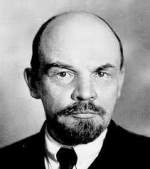
The most urgent thing at the present time is to take measures that will immediately increase the productive forces of peasant farming. Only in this way will it be possible to improve the conditions of the workers and strengthen the alliance between the workers and peasants, to strengthen the dictatorship of the proletariat . . . . This cannot be done without a serious modification of our food policy. [For further details, Click here.]
1930 India: Gandhi leads civil disobedience:
Indian independence leader Mohandas Gandhi begins a defiant march to the sea in protest of the British monopoly on salt, his boldest act of civil disobedience yet against British rule in India.
Britain's Salt Acts prohibited Indians from collecting or selling salt, a staple in the Indian diet. Citizens were forced to buy the vital mineral from the British, who, in addition to exercising a monopoly over the manufacture and sale of salt, also exerted a heavy salt tax. Although India's poor suffered most under the tax, Indians required salt. Defying the Salt Acts, Gandhi reasoned, would be an ingeniously simple way for many Indians to break a British law nonviolently. He declared resistance to British salt policies to be the unifying theme for his new campaign of satyagraha, or mass civil disobedience.
On March 12, Gandhi set out from Sabarmati with 78 followers on a 241-mile march to the coastal town of Dandi on the Arabian Sea. There, Gandhi and his supporters were to defy British policy by making salt from seawater. All along the way, Gandhi addressed large crowds, and with each passing day an increasing number of people joined the salt satyagraha. By the time they reached Dandi on April 5, Gandhi was at the head of a crowd of tens of thousands. Gandhi spoke and led prayers and early the next morning walked down to the sea to make salt.
He had planned to work the salt flats on the beach, encrusted with crystallized sea salt at every high tide, but the police had forestalled him by crushing the salt deposits into the mud. Nevertheless, Gandhi reached down and picked up a small lump of natural salt out of the mud—and British law had been defied. At Dandi, thousands more followed his lead, and in the coastal cities of Bombay and Karachi, Indian nationalists led crowds of citizens in making salt. Civil disobedience broke out all across India, soon involving millions of Indians, and British authorities arrested more than 60,000 people. Gandhi himself was arrested on May 5, but the satyagraha continued without him. (History.com)
1933 Various:
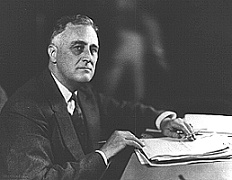
FDR broadcasts first fireside chat:
President Franklin D. Roosevelt holds the first of his radio-broadcast fireside chats. FDR used the informal radio addresses to explain his policies to the American public.
In an era before television, cell phones and iPods, FDR used the most immediate and intimate means of communicating with the public available at the time: the radio. During the 1930s, approximately 90 percent of American households owned a radio. Capitalizing on this, FDR used the medium for his fireside chats 31 times between March 1933 and June 1944, discussing a range of topics from New Deal economic policies to aid for Europe in the fight against fascism to reporting on the military and domestic fronts during World War II. While listeners could not actually see him and he was not actually next to a fireplace‑-photos show FDR at his desk surrounded by microphones and wires‑-the phrase fireside chat was coined by a journalist and evoked a comforting image during a time of great national anxiety. As one listener recalled, it was like the president with his voice, came into your house, calling us friends.
In his first fireside chat, Roosevelt explained his recent decision to close all banks for an extended holiday. The stock market crash of 1929 left the American public and banks nervous and susceptible to rumors of impending financial disaster. In February and early March 1933, investors worried about bank failures created panics by rushing to cash out their deposits for currency or gold. FDR stepped in and forced the closure of all banks beginning March 6 until the rumors were dispelled and the situation could be stabilized. During the March 12 broadcast, FDR thanked the public for the fortitude and good temper with which everybody [accepted] the hardships of the banking holiday.
Not everyone cheered FDR's bank closure. Some saw the action as an indicator of FDR's eagerness to invoke executive privilege. However, the bank closure did avert yet another financial panic and FDR's management of the crisis and his reassuring fireside chat boosted the public's confidence in his leadership. (History.com)
The SA stages several incidents along the German-French border.
1934 Various:
Holocaust: The Nazi Trade and Artisans Union declares a new boycott of Jewish businesses in Germany.
Estonia: Konstantin Pats seizes power.

1938 Anschluss: At 3 AM, Reichsfuehrer-SS Heinrich Himmler lands at Aspern Airport in Vienna. He is greeted by Ernst Kaltenbrunner with a Nazi salute and a proud "the SS is in formation and awaiting further orders." Kaltenbrunner is promoted to SS Brigadefuehrer and leader of the SS-Oberabschnitt Donau.
From Himmler by Roger Manvell and Heinrich Fraenkel: Himmler was sufficiently prepared for the Austrian putsch to have ready a new and special uniform of field grey in which to invade Austria. Accompanied by his staff and SS bodyguards, all heavily armed, he flew south to Aspern aerodrome, near Vienna. With him was his adjutant Wolff, Walter Schellenberg, who had been in charge of coordinating intelligence reports from Austria, and the Austrian official in the SD, Adolf Eichmann, now a specialist in Jewish affairs, who had prepared lists of the large numbers of Austrian Jews Himmler was determined should be given no chance to cause trouble.
The weather was bad and made the flight to Vienna in the overloaded plane unpleasant, and Schellenberg records that Himmler discussed with him the administration of the new state of Ostmark, as Austria was now to be called . . . . Himmler and his entourage arrived as Aspern aerodrome before daybreak. They were uncertain of their reception in Vienna, but by the time they arrived the struggle for Austria was already over. Hitler's troops had crossed the frontier overnight and on behalf of the provisional government orders had been given by Seyss-Inquart to the Austrian Army that they were to offer no resistance to the invaders. Himmler, who was Hitler's most senior representative in Austria, was met by the Austrian Chief of Police, Michael Skubl, whose feelings at having this duty to perform must have been bitter, since he had been appointed by Dollfuss on the very day of his murder by the Nazis. Himmler hurried by car to the Chancellery in Vienna to confer with Kaltenbrunner, the head of the Austrian SS. Following exactly the procedure he had originated for himself in Germany, Himmler dismissed Stubl and put the police in the charge of Kaltenbrunner. Leaving the immediate control of Vienna in this man's hands, Himmler left by air for Linz to supervise the reception to be given Hitler that afternoon in the town where he had lived as a child. With him went Seyss-Inquart, now the new Nazi Chancellor of Austria. On the same day Heydrich joined Kaltenbrunner in Vienna, and the Austrian capital began to experience the savagery of Nazi control.
Arthur Seyss-Inquart himself was to admit after the war that 79,000 arrests took place in Vienna within a matter of weeks. Jews were evicted, humiliated and forced to scrub the streets. Many men of distinction among those opposed to the Nazis, both Jews and non-Jews, were to be sent to Dachau and other camps in Germany; the freight trains transporting prisoners crushed together in wagons became a regular service from Austria.
Anschluss: A telegram [Document L-292] from the American Legation in Vienna to the US Secretary of State:
Numerous German bombers flying over Vienna dropping leaflets 'National Socialist Germany greets its possession, National Socialist Austria and her new Government in true indivisible Union.' Continual rumors small German troop movements into Austria and impending arrival Austrian Legion. SS and set in undisputed control in Vienna. Police wear swastika arm bands. Schuschnigg and Schmidt rumored arrested. Himmler and Hess here. [Signed] Wiley. (IMT)

Anschluss: Germany annexes Austria:
In early 1938, Austrian Nazis conspired for the second time in four years to seize the Austrian government by force and unite their nation with Nazi Germany. Austrian Chancellor Kurt von Schuschnigg, learning of the conspiracy, met . . . Adolf Hitler in the hopes of reasserting his country's independence, but was instead bullied into naming several top Austrian Nazis to his cabinet. On March 9, Schuschnigg called a national vote to resolve the question of Anschluss, or "annexation," once and for all. Before the plebiscite could take place, however, Schuschnigg gave in to pressure from Hitler and resigned on March 11. In his resignation address, under coercion from the Nazis, he pleaded with Austrian forces not to resist a German "advance" into the country.
The next day, March 12, Hitler accompanied German troops into Austria, where enthusiastic crowds met them. [See: Austria: The Other Germany.]
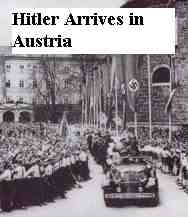
Anschluss: Hitler's car crossed the border in the afternoon at Braunau, his birthplace. In the evening, he arrived at Linz and was given an enthusiastic welcome in the city hall. The atmosphere was so intense that Goering in a telephone call that evening stated: "There is unbelievable jubilation in Austria. We ourselves did not think that sympathies would be so intense." Hitler's further travel through Austria changed into a triumphal tour that climaxed in Vienna, when around 200,000 Austrians gathered on the Heldenplatz (Square of Heroes) to hear Hitler proclaim the Austrian Anschluss. Hitler later commented: "Certain foreign newspapers have said that we fell on Austria with brutal methods. I can only say: even in death they cannot stop lying. I have in the course of my political struggle won much love from my people, but when I crossed the former frontier (into Austria) there met me such a stream of love as I have never experienced. Not as tyrants have we come, but as liberators."
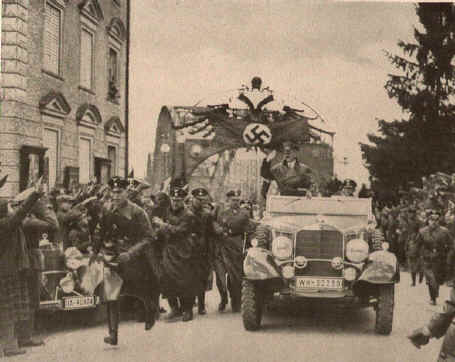
Anschluss: From a speech written by Hitler but broadcast on the radio this day by Reich Propaganda Minister Goebbels:
I have therefore decided to offer the millions of Germans in Austria the assistance of the Reich. Since this morning soldiers of the German armed forces have been crossing all of the German-Austrian borders. Armored units, infantry divisions and SS units on the ground and the German Luftwaffe in the skies, summoned by the new National Socialist Government in Vienna, will ensure that the Austrian People are within the very near future finally given the opportunity to determine for themselves their future, and thus their fate, through a genuine plebiscite. And these units are supported by the will and determination of the entire German nation.
Anschluss: Cardinal Theodor Innitzer declares: "The Viennese Catholics should thank the Lord for the bloodless way this great political change has occurred, and they should pray for a great future for Austria. Needless to say, everyone should obey the orders of the new institutions." Note: Cardinal Pacelli, the Vatican Secretary of State and future Pope Pius XII, soon recalls Innitzer back to the Vatican. Pacelli informs Innitzer that he must retract this statement. He is forced into signing a new declaration which reads, in part: "The solemn declaration of the Austrian bishops . . . was clearly not intended to be an approval of something that was not and is not compatible with God's law."

Anschluss: From a speech by Arthur Seyss-Inquart, the new Nazi Chancellor of Austria:
The Jews are the enemy of National Socialism. From the time of their emancipation their methods were directed to the annihilation of the folkish and moral worth of the German people and to replace a national and responsible ideology with international nihilism. It was really they who stabbed the Army in the back which broke the resistance of the Germans (in the First World War). The Jews are the enemy with whom no armistice or peace can be made. We will smite the Jews where we meet them and whoever goes along with them must take the consequences.
1939 Various:
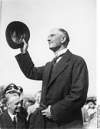
Poland: In Parliament, Prime Minister Chamberlain makes a public pledge of support for Polish sovereignty. This speech has been called one of the most important expressions of England's support for Polish independence. (THP) [See: What Were Adolf Hitler's Major Blunders?]
From Grand Admiral Erich Raeder's speech on the occasion of the German Heroes' Day:
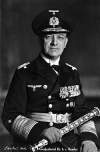
Throughout Germany celebrations took place on the occasion of Hero Commemoration Day . . . . These celebrations were combined for the first time with the celebration of the freedom to rearm . . . .
National Socialism, which originates from the spirit of the German fighting soldier, has been chosen by the German people as its ideology. The German people follow the symbols of its regeneration with as much great love as fanatical passion. The German people has had practical experience of National Socialism and it has not been imposed, as so many helpless critics abroad believe. The Fuehrer has shown his people that in the National Socialist solidarity of the people lies the great and invincible source of strength, whose dynamic power ensures not only peace at home but also enables us to release all the Nation's creative powers . . . .
This is the reason for the clear and unsparing summons to fight Bolshevism and international Jewry, the nation-destroying activities of which our own people have sufficiently suffered. Therefore, the alliance with all like-minded nations who, like Germany, are not willing to allow their strength, dedicated to construction and peaceful work at home, to be disrupted by alien ideologies and by parasites of a foreign race . . . .
If, later on, we instruct in the technical handling of weapons, this task demands that the young soldier should also be taught National Socialist ideology and the problems of life. This part of the task, which becomes for us both a duty of honor and a demand which cannot be refused, can and will be carried out if we stand shoulder to shoulder and in sincere comradeship to the Party and its organizations . . . . The Armed Forces and the Party thus became more and more united in attitude and spirit . . . .
Germany is the protector of all Germans within and beyond our frontiers. The shots fired at Almeria (this refers, of course, to the bombardment of the Spanish town of Almeria, carried out by a German naval squadron on the 31 May 1937 during the course of the Spanish Civil War) are proof of that . . . . They all planted into a younger generation the great tradition of death for a holy cause, knowing that with their blood they will lead the way towards the freedom of their dreams."
Vatican: Pope Pius XII is crowned
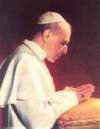
Pius XII, original name Eugenio Maria Giuseppe Giovanni Pacelli (born March 2, 1876, Rome, Italy--died Oct. 9, 1958, Castel Gandolfo), head of the Roman Catholic church, who had a long, tumultuous, and controversial pontificate (1939–58). During his reign the papacy confronted the ravages of World War II (1939–45), the abuses of the Nazi, fascist, and Soviet regimes, the horror of the Holocaust, the challenge of postwar reconstruction, and the threat of communism and the Cold War. Deemed an ascetic and “saint of God†by his admirers, Pius has been criticized by others for his alleged “public silence†in the face of genocide and his apparently contradictory policies of impartiality during World War II but fervent anticommunism during the postwar period. [For further information, click here.]
1940 The Winter War: Finland signs a harsh peace treaty with the Soviet Union, ceding almost all of Finnish Karelia. Finnish troops and remaining population are immediately evacuated.
1944 World War II: Various:
Great Britain bars all travel to neutral Ireland, which is suspected of collaborating with Nazi Germany.
Church and Reich: Bishop Frings again emphasizes that it is wrong to kill innocents just because they belong to another race, but once again he fails to mention the word Jew' or 'non-Aryan.' (THP) [See: Was the German Military Complicit in the Holocaust?]
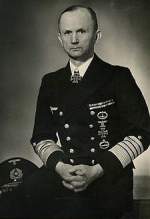
From a speech made by Karl Doenitz to the German Navy and the German people on Heroes' Day:
German men and women! . . . . What would have become of our country today, if the Fuehrer had not united us under National Socialism! Split into parties, beset with the spreading poison of Jewry and vulnerable to it, and lacking, as a defense, our present uncompromising ideology, we would long since have succumbed to the burdens of this war and been subject to the merciless destruction of our adversaries.
1945 Death: Jewish diarist Anne Frank (estimated).
1946 Nuremberg Tribunal: On day 79, Colonel Bernd von Brauchitsch testifies for Goering's defense:
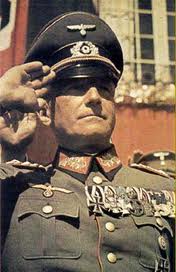
Dr Stahmer: Do you know of the attitude of Hitler with regard to the treatment of so-called terror-fliers who were shot down?
Brauchitsch: In the spring of 1944, the number of civilian air-raid casualties by machine-gunning increased suddenly. These attacks were directed against civilians working in the fields; against secondary railroads and stations without any military importance; against pedestrians and cyclists, all within the homeland. This must have been the reason for Hitler giving not only defense orders, but also orders for measures against the fliers themselves. As far as I know, Hitler favored the most drastic measures. Lynching was said to be countenanced.
Dr Stahmer: What was the attitude of the Reich Marshal of the Luftwaffe to this order?
Brauchitsch: The Commander-in-Chief and the Chief of the General Staff expressed their opinion that a most serious view must be taken of these attacks, which were directed solely against civilians. Notwithstanding, no special measure should be taken against these airmen. The suggestion that those who bailed out should be lynched and not afforded protection could not be agreed with. In view of Hitler's instructions, the Luftwaffe was forced to deal with these questions. They endeavored to prevent these ideas of Hitler, of which they disapproved, from being put into practice. The solution was to pretend that measures would be taken which, however, were not actually carried out. [For the full text of today's proceedings, Click here.]
State Secretary Paul Korner also testifies for Goering's defense:

Justice Jackson: Now, from time to time complaints came to you about the treatment of people in concentration camps, during all the time you were with Goering, did they not?
Korner: Yes, there were frequent complaints.
Justice Jackson: What did they complain of?
Korner: Various things.
Justice Jackson: Tell the Tribunal what the complaints were with which you had to deal.
Korner: Well, mostly from relatives of the people taken to concentration camps whose release was applied for; or complaints that these people had been taken to a concentration camp without reason.
Justice Jackson: That is, that they were innocent people, innocent of any offense?
Korner: The relatives asserted this.
Justice Jackson: Did you do anything to get them released from concentration camps?
Korner: The Reich Marshal had ordered that all complaints were to be replied to. Every case was followed up at once. Justice Jackson: And did you find that many of these people were innocent, or did you find that they were guilty?
Korner: If anybody was found to have been wrongly taken to a concentration camp he was released immediately. [For the full text of today's proceedings, Click here.]
Luftwaffe Field Marshal Albert Kesselring testifies:
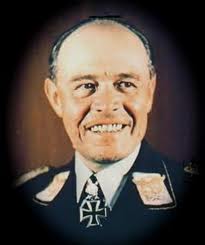
Dr Laternser: Did you get to know anything about the regrettable order that Russian commissars were to be shot after their capture?
Kesselring: I heard of this order at the end of the war. The air fleet, not being engaged in ground fighting, had actually nothing to do with this question. I think I can safely say the Luftwaffe knew nothing whatsoever about it. Though I very frequently had personal dealings with Field Marshal Von Bock, with commanders of armies and armored units, none of these gentlemen ever told me of such an order.
Dr Laternser: Did you know about the Commando Order?
Kesselring: Yes, I did.
Dr Laternser: And what did you think of this order?
Kesselring: I considered such an order, received by me as commander-in-chief in the Mediterranean, where I held a double post, as not binding for me, but as the outline of an order which left me a free hand in its application. On this question I held the view that it was for me, as commander-in-chief, to decide whether a Commando action was contrary to international law'or whether it was tactically justified. The view adopted more and more by the army group, which view was directed by me, was that personnel in uniform who had been sent out on a definite tactical task were to be treated and considered as soldiers. [For the full text of today's proceedings, Click here.]
1947 Cold War: Truman Doctrine is announced:

In a dramatic speech to a joint session of Congress, President Harry S. Truman asks for U.S. assistance for Greece and Turkey to forestall communist domination of the two nations. Historians have often cited Truman's address, which came to be known as the Truman Doctrine, as the official declaration of the Cold War.
In February 1947, the British government informed the United States that it could no longer furnish the economic and military assistance it had been providing to Greece and Turkey since the end of World War II. The Truman administration believed that both nations were threatened by communism and it jumped at the chance to take a tough stance against the Soviet Union. In Greece, leftist forces had been battling the Greek royal government since the end of World War II. In Turkey, the Soviets were demanding some manner of control over the Dardanelles, territory from which Turkey was able to dominate the strategic waterway from the Black Sea to the Mediterranean.
On March 12, 1947, Truman appeared before a joint session of Congress to make his case. The world, he declared, faced a choice in the years to come. Nations could adopt a way of life "based upon the will of the majority" and governments that provided "guarantees of individual liberty" or they could face a way of life "based upon the will of a minority forcibly imposed upon the majority." This latter regime, he indicated, relied upon "terror and oppression." "The foreign policy and the national security of this country," he claimed, were involved in the situations confronting Greece and Turkey. Greece, he argued, was "threatened by the terrorist activities of several thousand armed men, led by communists." It was incumbent upon the United States to support Greece so that it could "become a self-supporting and self-respecting democracy." The "freedom-loving" people of Turkey also needed U.S. aid, which was "necessary for the maintenance of its national integrity." The president declared that "it must be the policy of the United States to support free peoples who are resisting attempted subjugation by armed minorities or by outside pressures." Truman requested $400 million in assistance for the two nations. Congress approved his request two months later.
The Truman Doctrine was a de facto declaration of the Cold War. Truman's address outlined the broad parameters of U.S. Cold War foreign policy: the Soviet Union was the center of all communist activity and movements throughout the world; communism could attack through outside invasion or internal subversion; and the United States needed to provide military and economic assistance to protect nations from communist aggression.
Not everyone embraced Truman's logic. Some realized that the insurgency in Greece was supported not by the Soviet Union, but by Yugoslavia's Tito, who broke with the Soviet communists within a year. Additionally, the Soviets were not demanding control of the Dardanelles, but only assurances that this strategic waterway would not be used by Russia's enemies-as the Nazis had used it during World War II. And whether U.S. assistance would result in democracy in Greece or Turkey was unclear. Indeed, both nations established repressive right-wing regimes in the years following the Truman Doctrine. Yet, the Truman Doctrine successfully convinced many that the United States was locked in a life-or-death struggle with the Soviet Union, and it set the guidelines for over 40 years of U.S.-Soviet relations. (History.com)

1951 Death: Alfred Hugenberg: co-founder of the Pan-German League in 1890, the most powerful publicist in Weimar Germany, and one of the men most responsible for Hitler's appointment as Chancellor in 1933. Declared a fellow traveler by a de-Nazification court, he died on this day in Kukenbruch bei Rinteln.
1963 Winston Churchill: The House of Representatives votes to grant the former British Prime Minister honorary US citizenship.
1988 Anniversary of the Anschluss: Marking the fiftieth anniversary of the Anschluss, the award-winning (CBE) Austrian-born British biographer, historian and journalist, Gitta Sereny (who was 17-years-old at the time of the Anschluss), publishes a poignant reminiscence in The Times (London):
At 7:50 PM on Friday, March 11, 1938, Austria ceased to exist. At 9:30 PM Elfie, my best friend . . . phoned me. Could I meet her at the Johann Strauss statue in the park, she whispered. "Why are you whispering?" I asked her, idiotically, as I would find out. "Come," she said and hung up.
While I waited for Elfie in the deserted Stadtpark, I heard . . . that sound for the first time: that rhythmic shout of many voices, and then those words I never heard before and couldn't quite make out from that distance: "Deutschland erwache! Juda verrecke!" ("Germany Awake! Jewry Perish!")
When Elfie arrived, we found ourselves standing stiffly in the dark, listening. Then she said, "My father . . . " and stopped.
"What's the matter with your father?" I asked. "He is a Nazi," she said, her voice tight. "They told me tonight. He's been an 'illegal' for years." She cried. "He said I was never to speak to anybody at school who was a Jew, and that anyway," her voice sounded dead, "the whole place will be 'disinfected' from top to bottom. What shall I do?" she sobbed.
Two days later, Elfie and I walked around Vienna all day. On the Graben, one of Vienna's loveliest streets, near my home, we came upon a scene of fear. Guarded by men in brown uniform with swastika armbands‑-with a large group of Viennese citizens watching, many of them laughing‑-a dozen middle-aged people, men and women, were on their knees scrubbing the pavement with toothbrushes. In horror, I recognized one of the cleaners as Dr. Berggruen, our pediatrician who had saved my life when I had diphtheria as a four-year-old. He saw me start toward one of the men in brown; he shook his head and mouthed, "No," while continuing to work his toothbrush. I asked the soldier what they were doing; were they mad?
"How dare you," he shouted. "Are you a Jew?"
"No, and how dare you?" I said, and told him that one of the men they were humiliating was a great doctor, a saver of lives. "Is this what you call our liberation?" Elfie called out to all of them. She was a stunningly beautiful child, but her voice was already trained for singing, as clear as a bell. Within two minutes the crowd had dispersed, that guards had gone, the "street cleaners" had got up and gone away. "Never do that again," Dr. Berggruen said to us, sternly. "It is very dangerous for you." They gassed him in Sobibor in 1943.
1999 Former Communist Bloc: The Czech Republic, Hungary, and Poland join NATO.
Edited by Levi Bookin (Copy editor)
levi.bookin@gmail.com



Click to join 3rdReichStudies



Disclaimer: This site includes diverse and controversial materials--such as excerpts from the writings of racists and anti-Semites--so that its readers can learn the nature and extent of hate and anti-Semitic discourse. It is our sincere belief that only the informed citizen can prevail over the ignorance of Racialist "thought." Far from approving these writings, this site condemns racism in all of its forms and manifestations.
Fair Use Notice: This site may contain copyrighted material the use of which has not always been specifically authorized by the copyright owner. We are making such material available in our efforts to advance understanding of historical, political, human rights, economic, democracy, scientific, environmental, and social justice issues, etc. We believe this constitutes a "fair use" of any such copyrighted material as provided for in section 107 of the US Copyright Law. In accordance with Title 17 U.S.C. Section 107, the material on this site is distributed without profit to those who have expressed a prior interest in receiving the included information for research and educational purposes. If you wish to use copyrighted material from this site for purposes of your own that go beyond 'fair use', you must obtain permission from the copyright owner.
Please Note: The list-owner and the moderator of 3rdReichStudies are not responsible for, and do not necessarily approve of, the random ads placed on our pages by our web server. They are the unfortunate price one pays for a 'free' website.